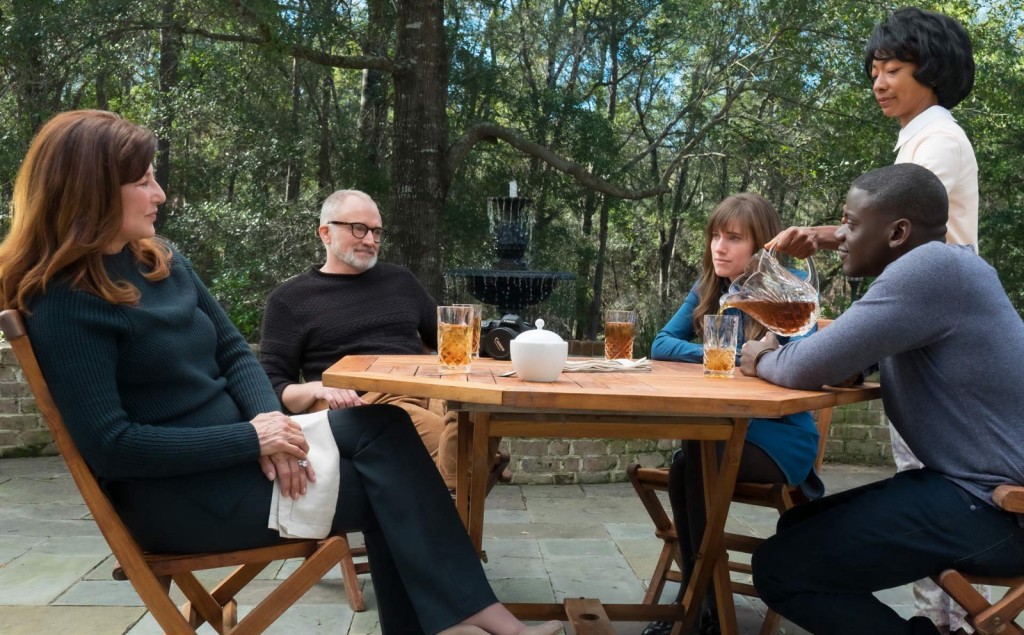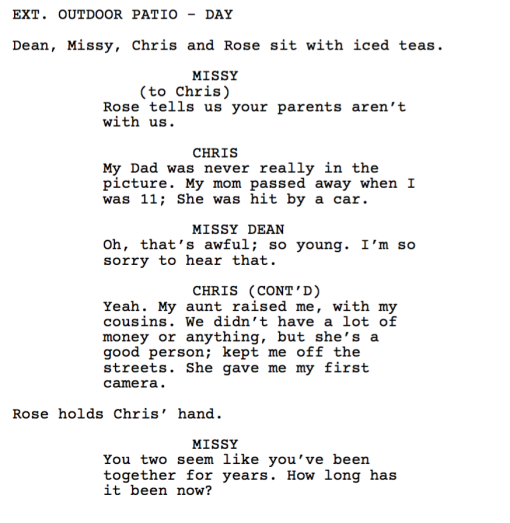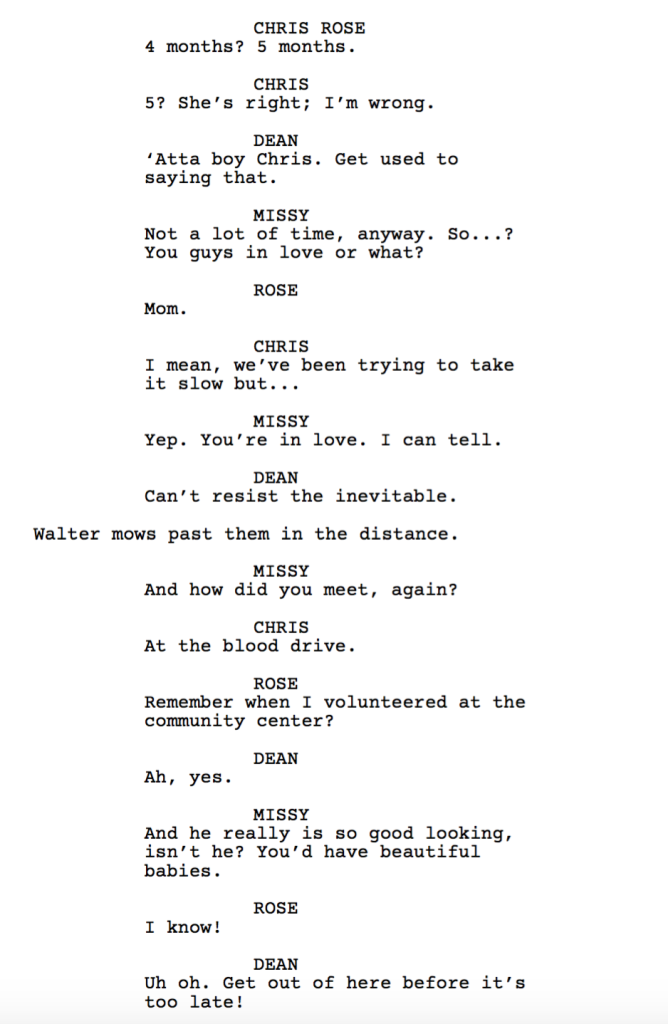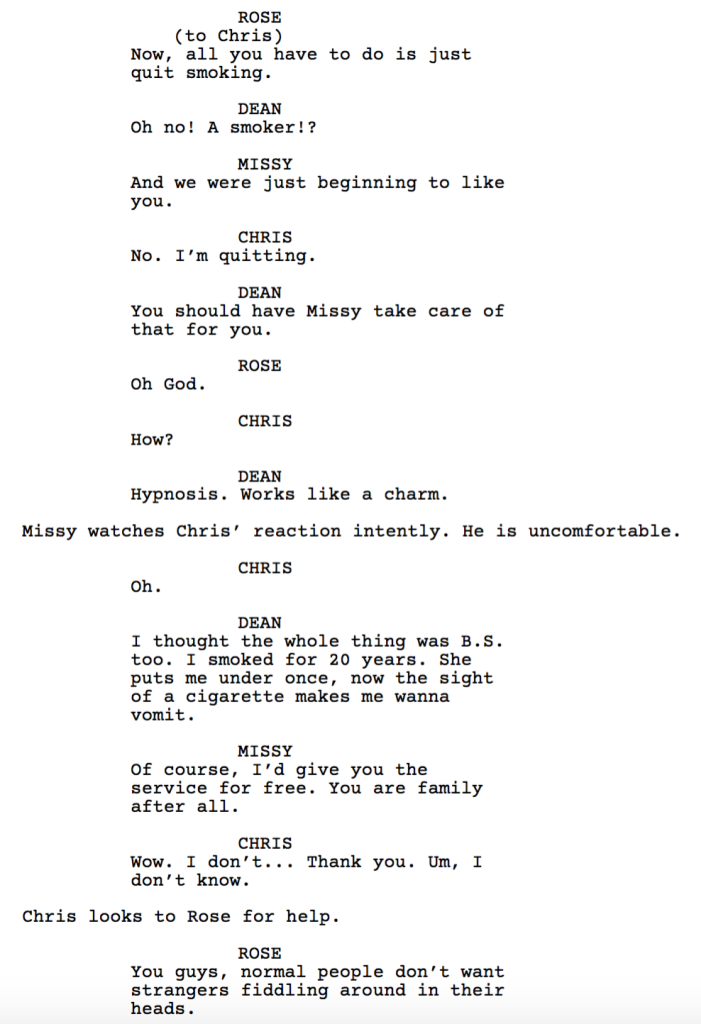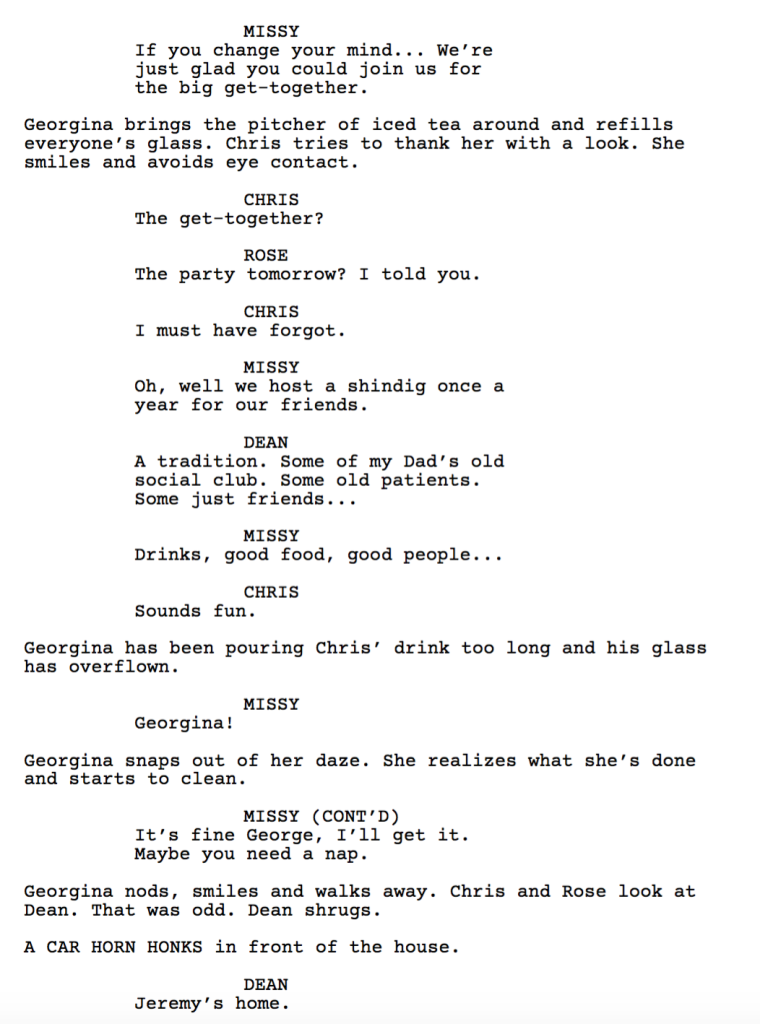DIALOGUE WEEK IS HERE! – All this week, I’ll be breaking down dialogue scenes from movies you love. Monday’s Dialogue Post is here. Yesterday’s post is here.
Today we’re covering a different kind of scene. Admittedly, it’s not the strongest scene of the week. But I picked it because it’s representative of the kind of “workhorse” scenes you’ll be tasked with writing throughout your career. Workhorse scenes are scenes that are saddled with backstory and plot setup. These scenes aren’t generally meant to entertain now. They pave the way so you can entertain later. With that said, you should always TRY to make these scenes entertaining. And Jordan Peele does about as good of a job as you can with this scene under the circumstances.
If you haven’t seen Get Out, it’s about a white girl, Rose, who invites her black boyfriend, Chris, to her rich parents’ (Dean and Missy) home for the first time. This scene takes place 20 minutes after they’ve arrived. Dean has given Chris a quick tour of the house and now everyone has reconvened in the backyard for a drink.
A big reason why this dialogue works has to do with what happened BEFORE THE SCENE. Before the scene, we learn that Chris is nervous to meet Rose’s parents because they don’t yet know he’s black. Also, right before they get here, they run into a deer and have to deal with a racist cop. This further destabilizes an already nervous Chris. Once they get to the house, the parents are sweet. But there’s something “off” about both them and the place.
All of this creates TENSION within the scene which builds subtext into the conversation – Isn’t this dad acting too nice? Isn’t it weird that a white family keeps all black servants? Do the parents like him? — This is the stuff you want, guys. You want conversations to be complicated by other factors. They should never be straightforward and obvious. That’s where boring dialogue thrives.
Let’s move on to the first line. “Rose tells us your parents aren’t with us.” Obviously, Peele wants to use this interaction to give us some backstory on Chris. What I like about this is that it comes about naturally. It’s not a protagonist who, unprompted, launches into the most traumatic moment of his life. He doesn’t get very quiet at the table for no reason until the parents notice. “Are you okay, Chris?” “No, it’s just… this reminds me of my parents is all. They died a few years ago in a fire.” That’s unprompted bush league dialogue.
Nor is this backstory brought up within a scene where it wouldn’t make sense. For example, it doesn’t come up in the car ride earlier. “Are you okay?” Rose asks him. “I’m just thinking about my parents is all. They would’ve liked you. I still can’t believe they died a year ago.” No, it’s brought up within a situation where someone who doesn’t know him asks him.
That’s something a parent might do. Especially a parent who wants to get to know the boyfriend of her daughter. The question is a little aggressive. But it works because of HOW the question is phrased. Notice how she doesn’t say, “What are your parents like?” “Oh, my parents aren’t alive.” “I’m sorry. What happened?” Instead, Missy references something that Rose told her. This allows her to ask the question in a more gentle and natural manner. “Rose tells us your parents aren’t with us.” It’s not even a question really. It’s a statement meant to get Chris talking.
A lot of times dialogue is finding the right combination of words so that the line doesn’t draw attention to itself.
Also notice that Chris doesn’t rattle on about it. This is another mistake writers make. They feel like they need to give this big powerful moment where Chris provides an intense recreation of the worst moment of his life. No. He gives nine lines. That’s it. And even better, those lines are split up. That always makes it more natural, when another character breaks it up. Otherwise you risk an un-asked-for monologue.
The next section is meant to shed more light on our couple’s history. And I like how this is handled. The mom starts pressuring them. Time to get married. Time to have babies. What this does is it shifts our focus more on that pressure than the fact that Peele is clearly sneaking more backstory in. Why do we need that backstory? Because the more we know about our characters, the more we care about them. Which improves any scene during which they’re in danger. You care more about people when you know more about them.
The next two sections of the scene are setup. First, we need to set up the later hypnosis scene. As a writer, this stuff can be annoying. You’re only writing it so that when we get to the hypnosis scene, it makes sense. As a result, there’s a tendency to slap these scenes on the page. Who cares if they’re clunky? They’re just setup. But if you take a little extra time, these moments can define your screenplay. Because if you care that much about the technical beats, we know you care about the big stuff.
“Now, all you have to do is quit smoking,” Rose says. I like the reaction to this line. Dean and Missy HAVE FUN with it. “Oh no! A smoker!?” “And we were just beginning to like you.” A lot of writers believe they have to make a BIG DEAL out of these moments so we remember the scene once the payoff arrives (for example, show Missy and Dean disappointed in Chris). But Peele plays against the obvious. They make fun of him for it. This keeps the scene light while also furthering the narrative that these two (the parents) are a little kooky. From there, we go into Missy’s pitch. And that prepares us for the later hypnosis.
Finally, we set up ANOTHER scenario – the “get-together.” This was a ballsy move by Peele. You usually don’t want to set up two things in one scene. The scene starts to feel like setup porn. I suggest avoiding it if possible but sometimes, in these low-budget movies, you don’t have a choice. With that said, they segue into it pretty smoothly. And that’s the trick with this stuff. As long as you can find that segue line or that invisible transition, you can pull it off.
“If you change your mind… We’re just glad you could join us for the get-together.” That’s better than: “Oh yeah! Guess what? We’re inviting a bunch of friends over tomorrow. I totally forgot to tell you!” This sounds like the writer didn’t have a plan for the scene. The character’s “Oh yeah!” mirrors the writers’ “Oh yeah!” Oh yeah, I have to set this up! Inferring that the party’s already on the schedule gives the impression that both the writer and the characters have everything taken care of.
One more thing I want to say. None of this works unless you have that creepy tension working as subtext throughout the scene. If Peele hadn’t set up a series of moments before this (the all black servants, the too-good-to-be-true-parents, the racist cop encounter, even the first scene in the movie, where the black guy gets kidnapped), then the audience isn’t going to be as patient during a scene that’s 90% backstory and setup. These scenes only work once you’ve got the suspension ball rolling in advance.
What I learned: This is a small hack. But it’s a clever way to bring up a plot point without making a big deal out of it. A lot of writers like to announce plot points like newspaper boys hawking papers in the 40s. “WE’RE GOING TO WAR! READ IT ALL ABOUT IT! DOWN WITH HITLER!” Plot points feel more natural when they’re introduced invisibly. Peele achieves this with the “I forgot” or “We told you about this, remember?” hack. “The get-together?” Chris asks. “The party tomorrow? I told you,” Rose replies. “I must have forgot.” Missy and Dean then provide six lines of info and now, without it having to be this GIANT announcement, the audience knows about the party.

